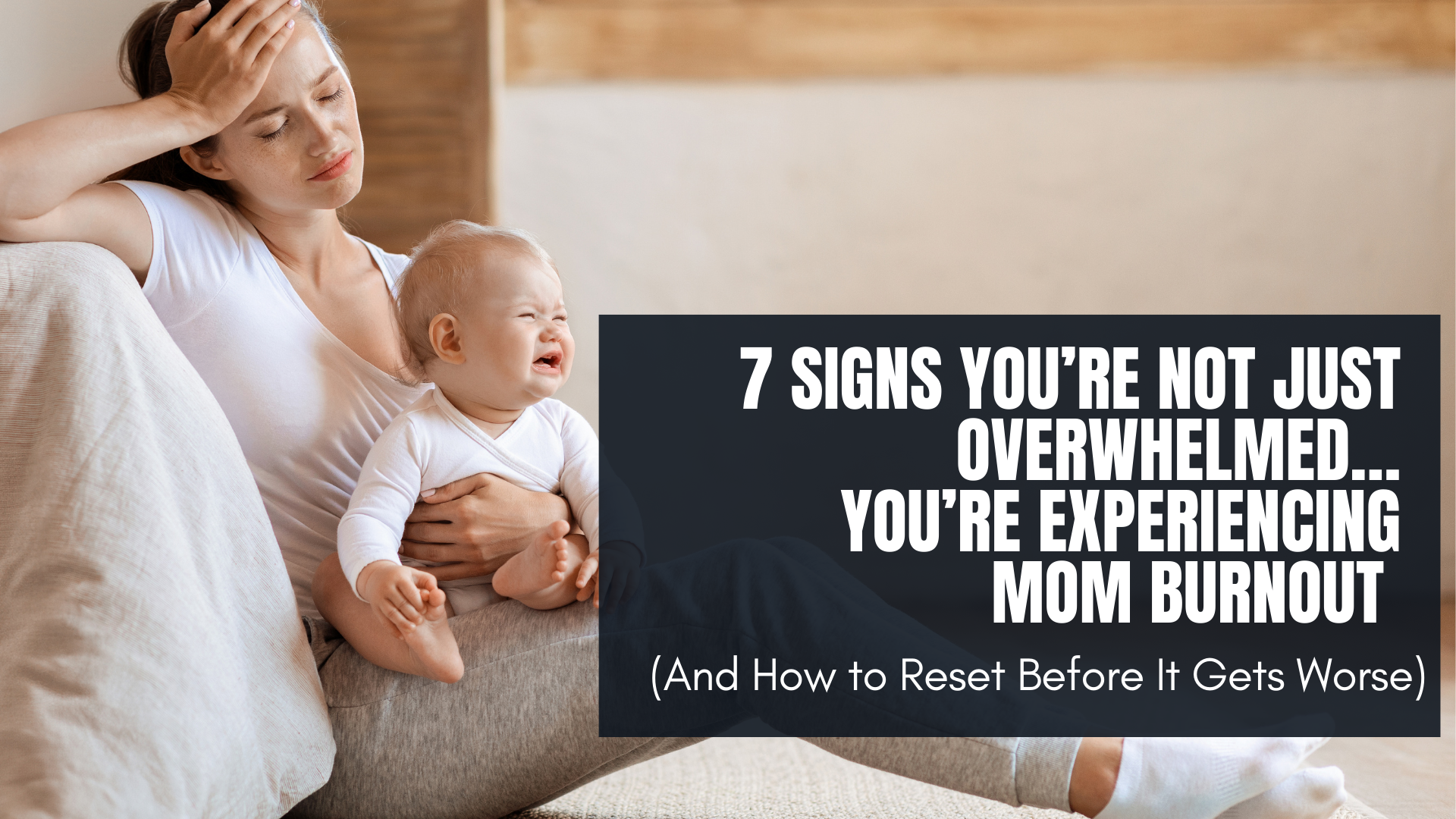6 Boundaries Every Mom Needs to Avoid Burnout
Hey mama,
Can we talk about the word that makes most of us squirm? Boundaries.
I know, I know. When you hear “boundaries,” you might think of those perfectly put-together moms who seem to have it all figured out. The ones who say things like “I don’t take calls after 8 PM” while you’re answering work emails at midnight because it’s the only quiet time you have.
But here’s what I’ve learned as a behavior analyst and mom of four (including twins!): boundaries aren’t about being selfish or having your life perfectly organized. They’re about creating sustainable systems that protect your energy so you can actually show up for the people you love.
Without boundaries, you’re essentially running a marathon with no water stops. Eventually, you’re going to collapse.
Why Most Moms Struggle with Boundaries
Let’s get real about why boundaries feel so hard:
The Guilt Factor
We’ve been conditioned to believe that good mothers are always available, always giving, always putting everyone else first. Setting a boundary feels like we’re failing at the most important job we’ll ever have.
The Fear of Judgment
“What will people think if I say no?” “What if they think I’m selfish?” “What if I’m not doing enough?”
The Perfectionist Trap
If we can just work harder, organize better, sleep less - maybe we can do it all without needing boundaries. (Spoiler alert: this doesn’t work.)
The Martyr Complex
Sometimes we wear our exhaustion like a badge of honor, as if suffering more means we love our families more.
But here’s the truth: Boundaries aren’t about loving your family less. They’re about loving them sustainably.
The 6 Essential Boundaries Every Mom Needs
Boundary #1: The “Good Enough” Standard
This is the boundary between perfectionism and sanity.
What it looks like:
• Dinner can be chicken nuggets and applesauce sometimes
• The house doesn’t need to be spotless for people to come over
• Store-bought cupcakes for the school party are perfectly fine
• Your kids’ rooms can be messy as long as it’s not a health hazard
Why you need it:
Perfectionism is burnout fuel. When you set impossible standards, you set yourself up for constant failure and exhaustion.
How to implement it:
Start asking yourself: “What’s good enough here?” Instead of spending two hours on elaborate meal prep, spend 30 minutes. Instead of handmaking Halloween costumes, buy them. Your kids won’t remember the Pinterest-perfect moments - they’ll remember if you were present and peaceful.
Common resistance:
“But I want to do special things for my kids!” You can still do special things - just not ALL the things, ALL the time.
Boundary #2: Your Time and Availability
This is the boundary between being helpful and being used.
What it looks like:
• You don’t answer non-emergency texts immediately
• You have specific hours when you’re “off duty” (even if it’s just 30 minutes)
• You don’t automatically volunteer for every school event
• You can say “let me check my calendar” instead of immediately saying yes
Why you need it:
When you’re always available, people (including your family) learn that your time isn’t valuable. This leads to constant interruptions and an inability to recharge.
How to implement it:
• Put your phone in another room during family dinner
• Designate one hour in the evening as “mom’s time”
• Stop responding to non-urgent requests immediately
• Use phrases like “I’m not available then, but I could help on [different day/time]”
Common resistance:
“What if there’s an emergency?” True emergencies are rare. Most things that feel urgent aren’t actually urgent.
Boundary #3: Your Physical and Emotional Energy
This is the boundary between being supportive and being depleted.
What it looks like:
• You don’t automatically become the family therapist for every problem
• You can say “I need a few minutes to process this” when someone dumps their emotions on you
• You don’t have to fix every problem your kids face
• You can step away when you’re feeling overwhelmed
Why you need it:
Emotional labor is real work, and it’s exhausting. When you’re constantly managing everyone else’s emotions, you have nothing left for yourself.
How to implement it:
• Practice saying: “That sounds really hard. What do you think you should do?”
• Take breaks during emotionally intense conversations
• Stop trying to prevent your children from ever feeling disappointed
• Recognize that you can be empathetic without taking on their emotions
One of my clients was exhausting herself trying to solve every friendship drama her 10-year-old daughter faced. We worked on shifting from “Let me fix this for you” to “This is tough. How do you want to handle it?” Her daughter became more resilient, and my client got her emotional energy back.
Boundary #4: Your Role vs. Everyone Else’s Role
This is the boundary between being helpful and being the only one responsible for everything.
What it looks like:
• Your partner handles their own relationship with their parents
• Kids are responsible for age-appropriate tasks
• You don’t automatically become the family’s personal assistant
• Other adults handle their own problems
Why you need it:
When you take on everyone else’s responsibilities, you rob them of the chance to grow while overwhelming yourself.
How to implement it:
• Stop doing things for capable family members that they can do themselves
• Let your partner handle their own scheduling, gift-buying, and communication
• Give kids age-appropriate chores and stick to them
• Resist the urge to “help” when someone is struggling with something they need to learn
Common resistance:
“It’s easier if I just do it myself.” Yes, in the short term. But you’re creating learned helplessness and burning yourself out.
Boundary #5: Your Standards vs. Other People’s Expectations
This is the boundary between living your values and performing for others.
What it looks like:
• You don’t have to justify your parenting choices to every family member
• You can skip events that consistently drain you
• You don’t have to maintain friendships that are one-sided
• Your house rules are based on what works for YOUR family
Why you need it:
When you’re constantly trying to meet other people’s expectations, you lose touch with what actually matters to you and your family.
How to implement it:
• Get clear on your family’s actual values vs. what you think you “should” value
• Stop explaining your choices to people who aren’t directly affected by them
• Practice saying “That doesn’t work for our family”
• Evaluate relationships and commitments based on whether they align with your values
Common resistance:
“But what will they think?” Ask yourself: whose opinion actually matters? And are their opinions based on understanding your situation?
Boundary #6: Your Needs vs. Everyone Else’s Wants
This is the boundary between self-sacrifice and self-care.
What it looks like:
• You eat meals without constantly getting up to serve others
• You take breaks when you need them, not when it’s convenient for everyone else
• You prioritize your sleep, health, and basic needs
• You ask for help instead of martyring yourself
Why you need it:
Your needs aren’t less important than everyone else’s wants. When you consistently put your needs last, you model for your children that self-care isn’t important.
How to implement it:
• Sit down and eat your own meal before jumping up to get someone else something
• Go to bed at a reasonable hour instead of staying up to do “one more thing”
• Take breaks when you’re tired, not when everyone else is happy
• Ask for what you need clearly and directly
Common resistance:
“I feel selfish.” Taking care of your basic needs isn’t selfish - it’s necessary. You can’t pour from an empty cup.
How to Set Boundaries Without Guilt
Start Small
Don’t try to implement all six boundaries at once. Pick one and start there.
Communicate Clearly
Instead of hoping people will read your mind, be direct: “I need 30 minutes to myself after work before I can help with homework.”
Expect Pushback
People who benefit from your lack of boundaries won’t love it when you start setting them. That’s normal and doesn’t mean you’re wrong.
Stay Consistent
Boundaries only work if you maintain them. If you set a boundary and then immediately break it, you teach people that your boundaries don’t matter.
Get Support
Talk to other moms who understand why boundaries matter. You need people who will cheer you on, not make you feel guilty.
What Happens When You Set Healthy Boundaries
Your Energy Returns
When you stop giving away all your energy, you have some left for yourself and the things that truly matter.
Your Relationships Improve
Healthy boundaries create healthier relationships. People learn to respect your time and energy.
Your Kids Learn Important Life Skills
When you stop doing everything for everyone, your family members learn to be more capable and independent.
You Model Self-Respect
Your children learn that it’s normal and healthy to have limits and take care of yourself.
You Become More Present
When you’re not constantly overwhelmed and resentful, you can actually enjoy your family.
When Boundaries Feel Impossible
Sometimes boundaries feel impossible because of your circumstances:
If You’re a Single Mom
Your boundaries might look different, but they’re still necessary. Focus on micro-boundaries - small ways to protect your energy throughout the day.
If You Have Unsupportive Family
You might need stronger boundaries with family members who don’t respect your limits. This is hard but necessary.
If You Have Very Young Children
Your boundaries will be more flexible, but you still need them. Even five minutes of protected time matters.
If You’re Dealing with Serious Issues
If you’re in an abusive relationship or dealing with significant mental health challenges, boundaries become even more critical. Please seek professional help.
Your Boundary Action Plan
Ready to start? Here’s your step-by-step plan:
Week 1: Choose One Boundary
Pick the boundary that resonates most with you. Start implementing it in small ways.
Week 2: Communicate Your Boundary
Let the relevant people in your life know about your new boundary. Be clear and direct.
Week 3: Stay Consistent
When people test your boundary (and they will), maintain it kindly but firmly.
Week 4: Evaluate and Adjust
How is it working? What needs to be tweaked? What feels sustainable?
Remember This, Mama
Boundaries aren’t about being mean or selfish. They’re about creating a sustainable way to love and care for your family without destroying yourself in the process.
You can’t be the mom you want to be if you’re constantly running on empty. You can’t model healthy relationships if you don’t have any boundaries yourself.
Your family needs you healthy, present, and sustainable more than they need you to be perfect or constantly available.
Setting boundaries is one of the most loving things you can do - for yourself and for your family.
Start today. Start small. But start.
Because you matter too, mama. And it’s time you started acting like it.
Ready to set boundaries without the guilt? If you’re struggling to protect your energy and time while managing all the demands of motherhood, you don’t have to figure it out alone. Try 24 hours of FREE coaching with me - because you don’t have to figure this out alone.
Ready to protect your energy and avoid burnout?
Download my free 5-Minute Reset guide for those overwhelming moments
Consider coaching support if you’re ready to move from surviving to thriving





















